#king louis xiii of france
Text
my senseless scrawl chibis icons for my dead boys:






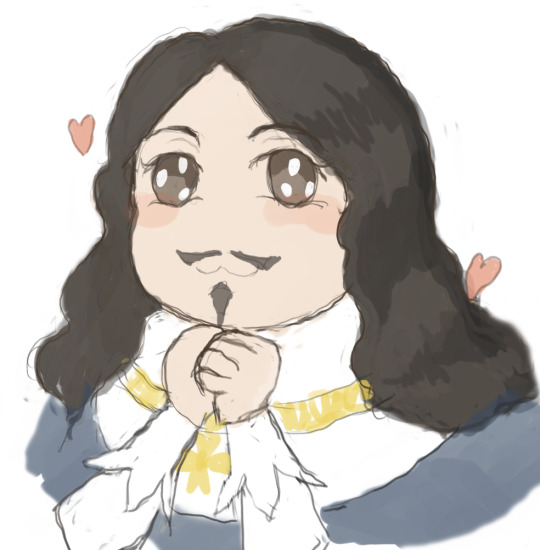

#cardinal richelieu#louis xiii#king louis xiii of france#armand richelieu#sketchbook#louichelieu#maybe#i love them sm#icons
35 notes
·
View notes
Text

King Louis XIII of France
#digital art#art#digital painting#history fanart#historical figures#doodle#history art#fanart#artists on tumblr#Louis XIII#king louis xiii of france
38 notes
·
View notes
Text

Frans Pourbus (Flemish, 1569–1622)
Portrait of King Louis XIII of France, 1611
The Cleveland Museum of Art
Pourbus inscribed the sitter’s age and the painting’s year in the composition: “The holy year 1611 at his age of 10 years.” Marie de’ Medici commissioned this work as she negotiated marriages for her two children to Philip III of Spain and Mary Marguerite of Austria, alliances that led to the European domination of the next two centuries by the Bourbon and Habsburg families.
#spanish netherlands#frans pourbus#flemish#flemish art#flanders#1500s#1600s#portait of king louis xiii of france#1611#pourbus#medici#de' medici#de medici#marie de medici#marie de' medici#philip iii of spain#mary marguerite of austria#bourbon#habsburg#art#fine art#european art#classical art#male portrait#europe#king#european#oil painting#fine arts#mediterranean
33 notes
·
View notes
Text
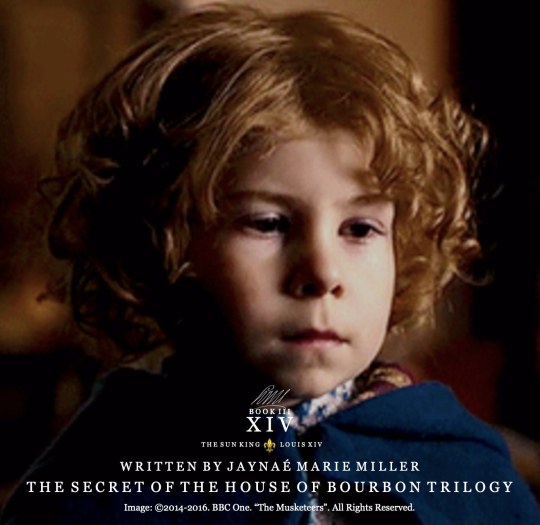
Book III/Part IX: ⚜️XIV⚜️
My father had not been dead long before events were set into motion that would change my life forever. I was too young to understand the chaos my father’s death created in court. Maman would say things to Mazarin I did not understand; whenever they spoke of me, I was present. I learned that as I grew up, I was there to remind everyone that I was the King, even as I was still in my minority. To some in the court, I was an obstacle that needed to be removed. It would be a few more years before I discovered what that meant—especially to my uncle Gaston.
The first time I remember leaving the palace as king was to sit on the lit de justice in the Grand Chamber of the Parliament. I did not want to go because we had to leave Philippe behind. I always wanted to have him by my side. As we grew up, I needed to have Philippe close to me—even when he did not wish to be.
That morning, I rose, had a bite to eat, and then was dressed by my valets in the finest clothing. I was led out of my bed chamber and into the hall where Maman was waiting. She took my hand and we made our way through the palace and into the light of day where a carriage awaited us. I did not notice much except the horses. There were so many of them on that day. As I was helped into the carriage by the footman, I noticed Maman speaking to Mazarin. When she was done, she was helped into the carriage, and sat beside me.
“Today is an important day, Louis,” she said to me. “You will preside over Parliament for the first time.”
“What is that, Maman,” I asked.
“Do not worry about that right now,” she said. “You are still young. I shall speak for you.”
As our carriage pulled away, I looked out the window. We were on our way to Paris. This would be the first time I would ride into the city as the King of France. I would not realize until I was older that it had only been 4 days since my father’s death.
On the way to Paris I fell asleep. When I felt the carriage stop, I woke up and looked out of the window to see the stone court of the Palais de la Cité. There were so many people there I was afraid to get out of the carriage. Once Maman had been helped out, she turned around.
“Your Majesty,” she said. “You must not keep the Parliament waiting.”
I knew she said those words loud enough so the crowd could hear. I hesitated but stood in the frame of the open door. The multitude fell silent. The footman helped me down. Maman took my hand, and we walked to the grand staircase. With each step, the people would bow to us. As we ascended the stairs, we were met by several men. The only one I recognized was my uncle Gaston. He bowed.
“Your Majesty,” he said. “It is good to see you.”
I nodded at him.
“You know why we are here, Gaston,” Maman said. “Louis is king now, and I will become regent on this day. It is only fitting, of course.”
“I was not aware this was something Louis would have allowed,” he whispered. “I can only imagine what you did to convince Mazarin of such a spectacle. My brother has not yet been laid to rest.”
Before mother could answer, we were greeted by several dressed in long red robes and peculiar hats. As they bowed, mother led me into the ancient halls of the old chateau. There were men and a few ladies lining the halls as Maman led me toward the Grand Chamber. Once inside, we met with shouts from the gallery.
“Vive le Roi! Vive le Roi!”
I was led to a special chair by two bailiffs on their knees bearing maces of gold. It was the lit de justice—a chair that was raised above the main floor. Draped in the royal colors covered with the fleur-de-lis, I was placed there beneath the baldachin. Mother sat beside me, yet she had to remain lower than the king. Soon, the room was filled with elaborately dressed nobles. When everyone was assembled, everyone looked at me. I was terrified. I wanted to go home. Thankfully, once the meeting was called to order, everyone’s eyes were on Maman.
I was too young to understand what was said among the counselors. On that day, my name was His Majesty. I had only been king for four days, yet they spoke of me as if I had ruled for generations. They must have known I was a child. I had not yet been breeched. Every now and then, one of the men would look at me and nod in obeisance as if to seek my approval. I was too afraid to move. I could only look at them with my eyes as wide as saucers.
After what seemed hours, Maman looked at me. She smiled and nodded to me. I knew then it was time to leave. I rose from my seat and everyone in the room bowed to me. On their knees, the two bailiffs from before helped me down and led Maman and I out of the chamber. In the hall, there was chaos that turned to whispers as we made our way back to the carriage. All I wanted to do was to return home and play in the gardens with Philippe.
“The power behind the throne can never belong to a woman,” someone said from within the crowd.
“Silence, fool,” a voice shouted. It was my uncle Gaston “You have forgotten that my mother, Queen Marie, did the same for the late king?”
We began walking faster as several men began shouting from behind. Our guards led all three of us quickly down the hall and into the light of day. When I was seen by the crowd, they bowed. Gaston escorted us to our carriage. Not since that day had I ever been so glad to be inside a carriage.
“I am moved by your kindness, Gaston,” Maman said from the window. “I will remember it.”
“I hope that you will, Madam,” he said, as he looked at me. “Your Majesty.”
I waved at him. I felt our carriage pull away and begin its journey home—which I learned was to the nearby Palais-Royal. When we were safe behind its gates, I stepped out. The servants were there to greet us. I saw Mazarin walking toward us. Before he reached us, I heard the familiar sound little feet running in my direction.
“Louis,” Philippe shouted as he ran toward me nearly knocking Mazarin over. He embraced me excitedly.
“Philippe,” Maman said, as she stepped out. “Behave.”
“You’re Majesties,” Mazarin said calmly. “It is good to see you.”
“Go inside,” Mother said to me.
Without a word, I took Philippe’s hand and led him toward the palace doors.
“Where did you go,” Philippe asked.
“I tell you later,” I whispered. I wanted nothing more than to forget. For the first time, I realized my father was dead and his death ended my childhood.
**** **** **** ****
After supper, I was bathed then dressed for bed. I noticed more valets in my chambers than usual. They occupied themselves with my clothing. I knew that new clothing had been made for me before my father died, but few pieces were befitting a king. As they busied themselves, went to the window. Darkness had fallen and all I could see were the shadows of people flitting around the gardens. I did not know what they were doing or if they were real. I imagined them as dark angels that had lost their way to heaven.
“Your Majesty,” a voice called to me. I looked to see Mazarin bowing into me.
“I do not like that word,” I said. “I am tired of hearing it.”
“You are king, Your Majesty,” he began. “From now until your death, everyone must address you as such.”
“Even Philippe,” I asked.
“When in court,” he answered. “And whenever you are performing your duties as king in the presence of your subjects.”
I stared at him as if he had spoken gibberish. How could I be a king when I could barely read or write? What little I had learned came from my governess. My wet-nurse had only left me less than two years prior. I was not ready to rule a kingdom.
“I want Papa,” I said.
“I know, Your Majesty,” he said walking over to me. He kneeled down and looked at me. “Your father was a king, and so must you be. He is in Heaven now but he will always be with you.”
“I am only a child,” I said, trying not to cry. “How can I be a king like Papa was?”
Mazarin smiled tenderly. I could tell he was trying to comfort me as a father would a son.
“Kings are not born, Your Majesty,” he said. “They are made over time. No king that ever ruled knew everything upon ascension. Child or Man, you will learn. I will make sure of it. But, it is late, and you must get some sleep. You must rise early.”
“I know,” I answered softly. “We are going to lay Papa to rest.”
He nodded. As he rose, he did something unexpected. He picked me up and carried me to bed. He pulled the covers over me.
“Good night, Your Majesty,” he said.
“Good night,” I answered.
He smiled then saw his way out. Not long after, I fell asleep. An hour later, I felt the familiar warmth of Philippe lying next to me. He was beginning to become a comfort to me. I drifted back to sleep.
“Louis,” I heard a voice say. I thought I was dreaming. It was the voice of a man, but there were no men that called me by that name since my father died. Philippe’s voice was juvenile; he had only recently learned how to pronounce my name properly.
“Louis,” the voice said again. I sat straight up. I looked across the dark room to see a shadow slip out into the antechamber. Philippe was sound asleep. I decided to follow. I quietly climbed out of bed and into the next room. I followed it into the hall. There were no guards at my door.
“Louis,” the voice whispered in my ear. I jumped as I turned to see my father.
“Papa,” I squealed, throwing my arms around him. I was too happy to notice he was cold to the touch. “I thought you were gone forever.”
“I came to see you before I go,” he said as he knelt before me.
“Where are you going,” I asked.
“You will find out one day,” he said. “But for now, you need not worry. You have your whole life ahead of you, Louis.”
“Papa,” I started. “I do not want to be king. I do not like it. No one calls me Louis anymore.”
He laughed.
“No one called you Louis except for me and your mother. And Philippe, of course.”
“Philippe! He would want to see you.”
“No,” Papa answered. “He needs his rest. Tomorrow will be hard for him.”
“I do not understand, Papa.”
“Remember what I said to you at Versailles,” he asked.
“You told me to watch over Philippe for you,” I answered.
“He will need you more than ever, Louis,” he began. “There will be times when all you will have is each other. Let nothing come between you and Philippe. Promise me.”
“I promise, Papa,” I whispered.
He smiled and stood up. I realized that I could see the hall through him.
“I was a king first, but a father forever,” he said. His voice began to fade. “The last of which brought me the greatest joy I had ever known. Be well, my son. Until we meet again.”
With those words, he was gone. I turned to see the guards holding one of my chamber doors open as Philippe slipped out.
“Louis,” he said. “Why are you awake?”
“Do not worry, Philippe,” I said as I took his hand. “Let us go back to bed now.”
“I had a dream, Louis,” he began as we headed into my chambers. “I saw Papa. He is not coming back.”
As the guards closed the doors, I stopped and looked my brother.
“No, Philippe,” I said. “He is not coming back. He is in Heaven.”
“I want to go there,” he said.
“One day, you will,” I said. “But not yet. I need you here.”
“Why?”
“Who will play with me in the garden if you go away,” I asked.
“You can play with Joujou,” he said.
“I would rather play with you than a puppy,” I said. “Besides, I would miss you.”
“I would miss you, too, Louis,” he said. “But Papa might be lonely.”
“He is there with the angels,” I said. “He is not lonely, I promise.”
Philippe yawned and rubbed his eyes.
“I will stay,” he said. “Papa said I had to.”
I smiled at him. I did not know whether to believe him or not. We went back to bed and slept peacefully until dawn.--The Secret of the House of Bourbon–XIV by Jaynaé Marie Miller. 10-2-2023
#historical fiction#historical drama#france#louis xiv#writers of tumblr#literature#house of bourbon#hob official tumblr#louis xiii#philippe i#the sun king#le roi soleil#ghosts#books#novels#books of tumblr#childhood#palais royal
10 notes
·
View notes
Text
Loyal brothers
The Capetian kings found their brothers no more difficult than their sons. The exceptions were the brothers of Henri I, Robert and Eudes, but thereafter the younger Capetians developed a tradition of loyalty to their elders. Robert of Dreux, the brother of Louis VII, who was the focus of a feudal revolt in 1149, was only a partial exception, for at that date the king was still in the East, and the real object of the hostility was the regent Suger. By contrast, Hugh of Vermandois was described by contemporaries as the coadjutor of his brother, Philip I. St Louis's brothers, Robert of Artois, Alphonse of Poitiers, and Charles of Anjou, never caused him any difficulties, and the same can be said of Peter of Alençon and Robert of Clermont in the reign of their brother Philip III. Even the disturbing Charles of Valois, with his designs on the crowns of Aragon and Constantinople, was always a faithful servant to his brother Philip the Fair, and to the latter's sons. The declaration which he made when on the point of invading Italy in the service of the Pope is revealing:
"As we propose to go to the aid of the Church of Rome and of our dear lord, the mighty prince Charles, by the grace of God King of Sicily, be it known to all men that, as soon as the necessities of the same Church and King shall be, with God's help, in such state that we may with safety leave them, we shall then return to our most dear lord and brother Philip, by the grace of God King of France, should he have need of us. And we promise loyally and in all good faith that we shall not undertake any expedition to Constantinople, unless it be at the desire and with the advice of our dear lord and brother. And should it happen that our dear lord and brother should go to war, or that he should have need of us for the service of his kingdom, we promise that we shall came to him, at his command, as speedily as may be possible, and in all fitting state, to do his will. In witness of which we have given these letters under our seal. Written at Saint-Ouen lès Saint-Denis, in the year of Grace one thousand and three hundred, on the Wednesday after Candlemas."
This absence of such sombre family tragedies as Shakespeare immortalised had a real importance. In a society always prone to anarchy the monarchy stood for a principle of order, even whilst its material and moral resources were still only slowly developing. Respectability and order in the royal family were prerequisites, if the dynasty was to establish itself securely.
Robert Fawtier - The Capetian Kings of France
#xii#xiii#xiv#robert fawtier#the capetian kings of france#henri i#robert i de bourgogne#louis vii#robert i de dreux#abbé suger#philippe i#hugues de vermandois#louis ix#robert i d'artois#alphonse de poitiers#charles i d'anjou#philippe iii#pierre d'alençon#robert de clermont#philippe iv#charles de valois
7 notes
·
View notes
Text
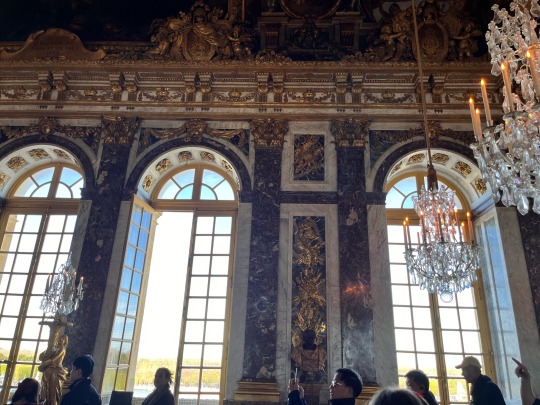
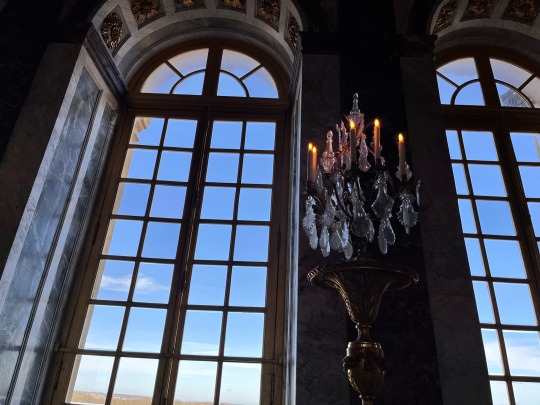
#versailles#paris#paris france#france#chandler bing#asthetic#red and blue#window view#sunlight#sunrise#candles#paintings#old paintings#solider poet king#kings and queens#vibes#gothic#gold#king louis xiv#king louis xiii#marie antoinette#marie antoniette 2006#old France
1 note
·
View note
Text






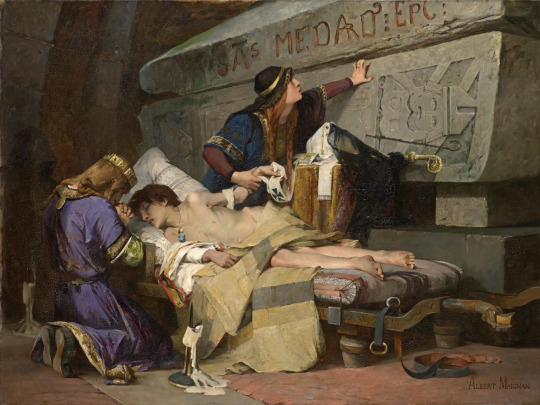
There's something truly magical about late 19th century history paintings.
It's the last gasp of the French Academic style, but instead of lots of drapery and allegory, they are taking cues from the rising tide of archaeological research and forward-looking school of narrative illustration, which adds up to the first real attempts to depict the past as best they it could be imagined. These paintings have more in common with the old-(ish) National Geographic illustrations of life in ancient Knossos than they do with their contemporaries in the Pre-Raphaelite movement.
From top to bottom-
"Cardinal Richelieu at the Siege of La Rochelle," by Henri-Paul Motte (1881)- depicts the siege by the forces of Louis XIII of France, lead by Cardinal Richelieu, against the Huguenots in the port of La Rochelle, 1627-1628
"Bringing Home the Body of King Karl XII of Sweden," by Gustaf Cederstrom (1884)- depicts the route of the Swedish army following a failed invasion of Norway that ended with the death of King Karl XII, 1718
"Zenobia's Last Look on Palmyra," by Herbert Schmalz (1888)- depicts the Palmyrene Queen Septimia Zenobia in the moments before leaving her besieged capitol, having been captured by the forces of the Roman emperor Aureliuan, 272 AD
"Reply of the Zaporozhian Cossacks to Sultan Mehmed," by Ilya Repin (1880s)- depicts the supposedly historical story of the Cossacks sending an insulting reply to an ultimatum from the Sultan of the Ottoman Empire, Mehmed IV, 1676
"The Execution of Lady Jane Grey," by Paul Delaroche (1833)- depicts the execution of the teenaged Lady Jane Grey, who had been elevated to the throne of England and Ireland for (approx) nine days in July of 1553. Her execution was at the Tower of London in February, 1554
"The Cadaver Synod" by Jean-Paul Laurens (1870)- depicts the posthumous trial of Pope Formosus by his eventual successor Pope Stephen VI ten months after Formosus' death, 897
"Chlodobert's Last Moments" by Albert Maignan (1880)- depicts the death of the Merovingian Prince Chlodebert, son of Chilperic I, before the tomb of Saint Medard, where the prince had been brought in the hope of a miracle, 580
516 notes
·
View notes
Text

The Triumph of Rome: The Youthful Emperor Constantine Honoring Rome by Peter Paul Rubens, unused design for a series of tapestries about Constantine commissioned by King Louis XIII of France
Flemish, c. 1622-1623
oil on panel
Mauritshuis, The Hague
#triumph#Ancient Rome#Emperor Constantine#Constantine I#Constantine the Great#history painting#art#painting#Flemish#baroque#Peter Paul Rubens#Rubens#Mauritshuis
103 notes
·
View notes
Photo

Anne of Austria
Anne of Austria (1601-1666), as the wife of King Louis XIII of France (r. 1610-1643), was queen consort of France and of Navarre when the Kingdom of Navarre was annexed by the French Crown. She also acted as regent for her son, King Louis XIV of France (1638-1715), during the early years of his reign.
Continue reading...
52 notes
·
View notes
Video
Une bibliothèque, c'est le carrefour de tous les rêves de l'humanité.
- Julien Green
In the heart of Paris lies a treasure trove of precious books and cultural artefacts known as the Bibliothèque Nationale de France - Richelieu. The royal library complex, once reserved for scholars and researchers, is now accessible to the general public who can visit its magnificently restored reading rooms, garden and brand new museum
The site is a stone’s throw from the Palais Royal and the Comédie-Française theatre, all once belonging to Cardinal Richelieu (1585-1642), close advisor and foreign secretary to King Louis XIII. A patron of the arts, Richelieu was also the founder of the Académie Française for the protection of the French language. The Bibliothèque Nationale de France (BnF) has over 40 million documents across four sites, the main ones being BnF François-Mitterrand on the left bank of the Seine for printed works and audiovisual documents, and the Richelieu branch for “specialist” collections - manuscripts, drawings, antiques and precious items.
The stunning centre piece of the Bibliothèque Nationale de France - Richelieu is the Oval Room which is the majestic reading room. Its construction started in 1897 with architect Jean-Louis Pascal and it was inaugurated only in 1936. Nicknamed the ‘Oval Heaven’, it boasts impressive volumes: 44 metres in length, 33 metres in width and 18 metres in height. It features enchanting mosaics, gilding, ornamental paintings, painted decor and unique pieces of furniture.
Among its priceless acquisitions include, the Great Cameo of France, Dagobert’s throne and Charlemagne’s chess set. Manuscripts such as the ‘Psalter of Saint Louis’, Victor Hugo’s ‘Notre Dame de Paris’, and a score by Mozart can be seen alongside prints by artists from Rembrandt to Picasso. Perhaps the star acquisition amongst its many priceless holdings include one of the first copies of the Gutenberg Bible.
From September 2022 the Oval Room was no longer restricted to accredited academics and scholars but to general members of the public too.
I recently went there to do some scholarly research for a side project and I was enthralled by the heavenly spectacle of the Oval Room.
#green#julien green#quote#french#library#national library#books#reading#learning#bibliotheque nationale de france - richelieu#richelieu#oval room#paris#france#arts#culture#architecture#design#aesthetics#beauty
312 notes
·
View notes
Text

would you be his master?
64 notes
·
View notes
Text
Time traveler, Elias. A French royal.
In the vast expanse of the universe, a galaxy shimmered with the stories of a man unlike any other—Elias. Born of a distant star system, Elias possessed extraordinary abilities: he could bend time, shift his form, and adopt any identity he chose. His curiosity about the universe’s countless narratives propelled him through time and space, leading him to Earth—a planet rich with history and drama.
Elias's latest fascination was the Earth's historical tapestry, specifically France during the 1600s. He chose to immerse himself in one of its most vibrant epochs—the reign of King Louis XIII, mistakenly recalling the name as King George in his intergalactic data banks. His goal was not just to observe but to participate, to live amongst the figures of history.
Transformation and Journey
Elias stood beside his time machine, a sleek structure of chrome and pulsating lights that hummed softly in the cold silence of space. Before embarking on his journey to 17th century France, Elias initiated his transformation. His body shimmered as his molecular structure rearranged itself. His skin took on a pale hue, his eyes a deep brown, and his hair curled into the fashionable shoulder-length locks of the time. He grew slightly taller, his physique molding into an elegant, aristocratic form—a perfect specimen by the standards of any era.
The final touch was his attire. With a thought, the fibers of his alien fabric morphed, taking on the rich textures and colors of a nobleman's wardrobe of the 1600s. He donned a doublet of deep blue velvet, breeches, and a lace collar, his boots polished to a high shine. Elias looked into the reflective surface of his machine; he now bore the image of a French aristocrat, complete with a feathered hat resting jauntily upon his curls.
Arrival and Adaptation
With a flicker of light and a ripple through the fabric of reality, Elias and his machine discreetly arrived in a wooded area near Paris. He stepped out into the fresh, earthy air of the past, the ground firm under his heeled boots. Hidden from view, he practiced his French accent, letting the lilting tones and courtly phrases roll off his tongue until he sounded every bit a man of France.
Elias quickly made his way to Paris and, using his charm and wit, infiltrated the royal court. His uncanny ability to mimic behaviors and his knowledge of historical events allowed him to blend in seamlessly. The court was a whirlwind of intrigue and opulence, and Elias thrived in it, his every movement and decision calculated to bring him closer to the king.
Rising in the Court
King Louis XIII, known for his complex personality and interest in the arts—and, as Elias had discovered in his data, a subtle fondness for attractive men—soon took notice of Elias. His intrigue was piqued not only by Elias’s striking looks but also by his insightful conversations and mysterious air.
Elias became a regular companion to the king, discussing art, politics, and philosophy. His unique perspectives and solutions to courtly issues, often inspired by his journeys across time and galaxies, made him indispensable. Despite his origins and abilities, Elias found a genuine connection with Louis, appreciating the king's intellect and often convoluted emotions.
The Man Behind the Mask
As months turned into years, Elias, now known as the Comte de Vire, lived a life full of earthly pleasures and royal confidences. Yet, beneath the grandeur, he remained a traveler at heart, always aware of his true self. He documented his experiences meticulously, storing them in the vast libraries of his mind to share with his own kind, across the stars.
Though he could have lived centuries in the blink of an eye, Elias knew his time at the French court would eventually come to an end. The pull of other times and worlds was strong. But as he prepared to leave, he realized that his journey through the past had changed him, imbuing him with a deeper understanding of humanity’s complexities and beauty.
With one last look at the gilded halls of the palace, Elias stepped back into his machine, the man who could traverse galaxies disappearing with a whisper into the fabric of time, his heart ever enriched by the memories of a king and a court that once, even if just for a short while, he could call home.
Elias, now the Comte de Vire, swiftly adapted to the rhythms and rituals of court life in 17th century France. Each morning, he awoke in his luxurious chambers furnished with opulent tapestries and intricate furniture that spoke of a craftsman's hand long stilled. His valet, a young Parisian lad, would assist him in dressing, layering the fine linens and arranging the rich fabrics that marked his noble status.
Breakfast was a subdued affair in his quarters, often just fresh bread with a bit of cheese, and sometimes fruit, all washed down with a small cup of wine. The real spectacle of dining came later in the day, at communal meals where the court gathered in all their finery. Here, Elias would navigate the delicate dance of court politics, his keen senses picking up undercurrents of intrigue among the clink of cutlery and murmur of voices.
Afternoons were reserved for various court activities. Elias often attended the king during his hunting excursions. These provided a chance to discuss matters of state and philosophy while riding through the extensive royal forests. The physical activity was a pleasure for Elias, whose alien constitution thrived on the challenge, and it also cemented his bond with King Louis.
A Trusted Confidant
As one of the king’s favorites, Elias also participated in the more intellectual pursuits of the court. He attended poetry readings in the royal library, discussions on the latest scientific discoveries, and debates on theological discourse. His unusual insights and exotic experiences, masked as the wisdom from distant travels on Earth, made him a captivating figure in these circles.
Evening Entertainments
Evenings were a grand affair, often beginning with large dinners followed by balls or performances in the palace's opulent halls. Elias, with his grace and elegance, excelled in these settings. His ability to dance flawlessly, a skill enhanced by his alien agility, made him a desired partner among the ladies of the court, and his refined conversation endeared him to many.
During quieter moments, Elias enjoyed the king’s more private company, where they shared a love of the arts. King Louis had a penchant for music and often invited esteemed musicians to perform. In these settings, Elias shared tales of distant stars and celestial melodies, cleverly veiled as fantasies, which delighted the king’s imagination.
An Alien Among Humans
Amidst the splendor and the ceaseless whirl of court life, Elias maintained his extraterrestrial nature hidden beneath his human facade. He adapted his daily routines to fit those of a 17th-century nobleman, yet at night, in the privacy of his chambers, he reverted briefly to his true form, allowing his body to rest in its natural state—a luminous, fluid presence that hummed with the quiet energy of the cosmos.
His room was equipped with hidden compartments where he kept his alien technology and instruments that monitored cosmic events and time-space coordinates, ensuring his link back to his own world remained intact.
The Looming Deadline
As the months slipped by, Elias, now deeply entrenched in the life of the 17th-century French court and closely bonded with King Louis XIII, faced a crucial turning point. His time device, a marvel of his advanced civilization, imposed a strict rule: remain in any non-native time period for no more than two years or risk becoming permanently anchored to that era, unable to return or travel elsewhere. With 18 months already behind him, the six-month countdown began.
The Richness of Life at Court
Elias's days were a tapestry of elaborate rituals and intimate connections. He had not only the king's ear but also the camaraderie and affection of other notable figures within the court, including several he met during the private, more risqué gatherings. These relationships were complex, woven with threads of desire, intrigue, and mutual respect.
Each individual offered something unique: a young duke taught him the finer points of fencing, a pastime that became both a physical and strategic exercise; a witty marquis shared the unspoken rules of navigating court gossip and alliances; and a poet, a regular at the smaller, more intimate gatherings, provided a window into the soulful side of the court through verses that often mirrored Elias's own hidden feelings of displacement and longing.
The Deepening Bonds
The king and Elias shared more than just a bed; they shared dreams and fears, the king speaking of the burdens of monarchy, Elias listening and offering advice culled from his vast experience across galaxies. These conversations often took place in the quiet sanctity of the king’s private chambers, away from the prying eyes and ears of the court.
As Elias’s departure neared, these moments grew more poignant, tinged with the unspoken knowledge of their impending end. The king, initially unaware of the true nature of Elias’s dilemma, came to sense his confidant’s growing melancholy.
The Decision to Leave
With the two-year mark approaching, Elias knew he had to prepare to leave, a decision that weighed heavily on him. He began to withdraw slightly, trying to ease the pain of his eventual departure for both himself and those he cared for. Yet, as he started to pull away, it only drew some of his closest companions closer, sensing the change and desiring to make the most of the remaining time.
One evening, in the cover of the royal library, Elias shared his secret with the king. He explained his otherworldly origins and the rules that bound him, expecting disbelief but meeting instead an understanding only a fellow bearer of heavy burdens could offer. The king was devastated but honored Elias’s trust, vowing to keep his secret.
Preparing for Goodbye
The final weeks were a bittersweet mixture of last experiences and quiet farewells. Elias spent his days reflecting on what he had learned about humanity—its capacity for love, its pursuit of pleasure, and its grappling with power and morality. Each relationship had enriched him, taught him new facets of human emotion and connection that he could have never comprehended in the abstract vastness of space.
At a grand farewell masquerade, the court turned out in full, the air one of celebration but underlaid with a current of farewell. Elias danced with the king, his friends, and his lovers, each dance a goodbye, each smile a memory to cherish.
Departure
When the night of departure finally arrived, Elias slipped away quietly after the festivities, his heart heavy but his resolve firm. He returned to his time machine, set in the secluded woods where he had first arrived. As he activated the controls, the soft hum of the engine a familiar comfort, he took one last look at the starry sky—so different, yet the same as the one above his own home.
The machine whirred to life, and with a final pulse of light, Elias left the 17th century behind, carrying with him the lessons of love, loyalty, and humanity—a traveler forever changed by his journey among the stars.

#bodyswap#mental change#male transformation#fantasy#personality change#male body swap#gay#male tf#disguise transformation#time travel#king
15 notes
·
View notes
Photo
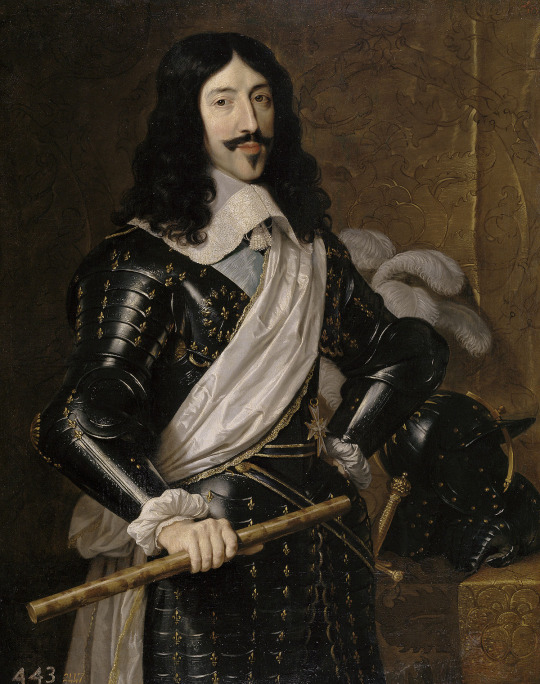
Philippe de Champaigne (French, 1602–1674)
Louis XIII of France (1601-1643), 1635
Louis's widow, Queen Anne, dispatched this portrait to the Spanish court in 1655 as a gift to her brother King Philip IV.
#Philippe de Champaigne#french#franc#louis xiii#louis xiii of france#king#art#france#spain#father of the sun king#europe#european#european history#art history#western civilization#knight#spanish art
42 notes
·
View notes
Text
The Quartering of Ravaillac
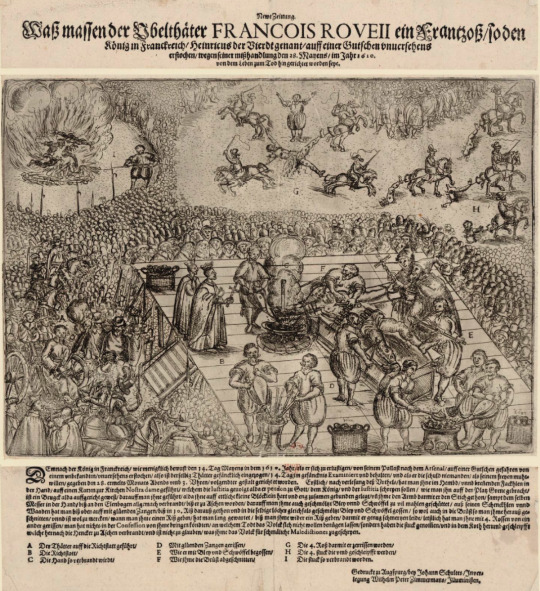
Before the guillotine made French people equal, and before the abolition of capital punishment altogether made them equal and also not dead, tradition dictated that commoners be hanged and nobles beheaded. Two crimes however warranted a special kind of execution, being heresy with the condemned burnt at the stake and in this case regicide, which specifically demanded quartering for some reason. François Ravaillac was the product of the French Wars of Religion, a series of conflicts during the Protestant Reformation that tore France appart, only ending when the leader of the Calvinist Huguenots Henri III de Bourbon, king of Navarre and issued from a cadet branch of the royal dynasty of France, succeeded to Henri III de Valois, king of France. The condition to his coronation was for him to convert to Catholicism, which he did, being quoted as saying “Paris is well worth a mass”. Ravaillac was born in a staunchly catholic family, being raised by his two uncles, both canons in the local cathedral, to bear a fervent hatred of Huguenots. His instable mind led him to quit a well-off situation working as a clerk to try and join a monastic order, of which he was kicked out after only a few weeks. Now penniless and aimless, he started experiencing visions and confessed multiple times over the years of having committed “homicide through intent”, growing more and more resentful of the king whom he saw as the Antichrist ready to wage war on his people and move the Holy See from Rome to Paris. After stealing a knife from an inn, he eventually graduated to “homicide through actual homicide” after stalking the royal carriage all the way to one of the traffic jams Paris is famous for, giving him the opportunity to stab the king twice in the chest when it stopped.
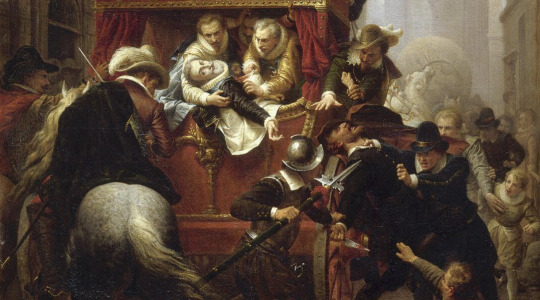
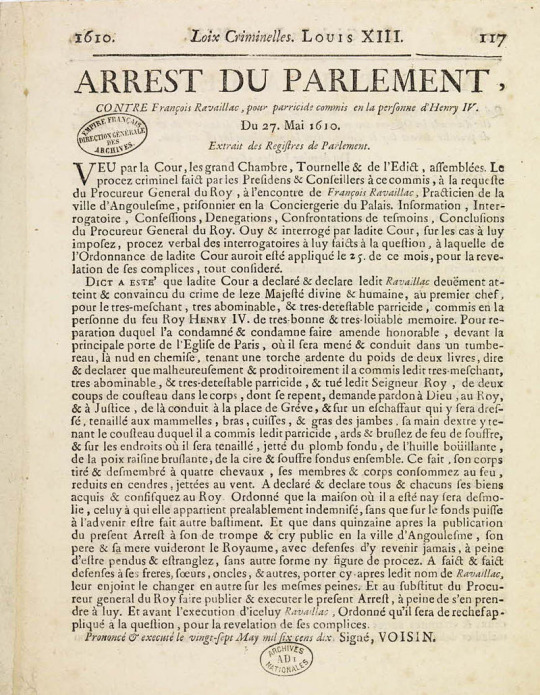
Execution warrant for François Ravaillac from the Parisian parliament, headed with the name of king Louis XIII and bearing the later archival stamps of both the French Empire and French Republic. It describes the murder as a parricide, the murder of a relative, as the king was seen as a literal father figure to all his subjects.
After being held in protective custody in a private hotel, then transferred to the Conciergerie prison and tortured/tried for ten days, Ravaillac was sentenced to death on the 27th of May 1610. His regicide was ruled to be the act of a lone religious fanatic without any accomplice.
The same day, he was taken to the place de Grêve in front of Paris’ town hall, where public executions had traditionally been held for at least 300 years. All according to his execution warrant, Ravaillac’s chest, arms, thighs and calves were pulled apart with tongs; his right hand which had held the knife was cut off and thrown onto burning sulfur; his wounds were covered in molten lead, boiling oil, pitch, wax and sulfur; finally his limbs were attached to four horses, pulling them from their sockets - allegedly with some help from an axe - completing the quartering proper.
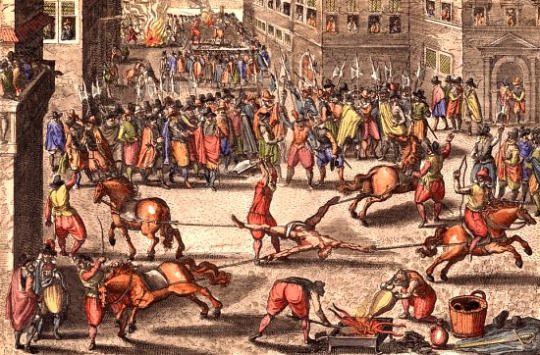
Unfortunately for him and in a quite striking karmic twist, some insult was added to Ravaillac’s supplice, as his legacy was to cement Henri IV’s own as the Good King Henry. The king’s martyr at the hand of a madman garnered sympathy and dispelled his previous image of a Bourbon usurper with Catholics and of a relapse with Protestants, working wonders to unify the two under the new monarchy. Henri’s progeny would not only rule France for another 182 years without interruption, but Spain, Luxembourg and other holdings in Italy.
138 notes
·
View notes
Text
"To all intents and purposes she may be counted among the kings of France"

The hour that struck the death of Louis VIII was arguably the most critical in the history of the Capetian family. The new king, one day to be St Louis, was still a child. The trend of events in the previous two reigns had brought the higher nobility to realise that its independence would soon be seriously threatened. But a unique opportunity was raised to the regency of the queen-mother, Blanche of Castile, on the pretext that she was a woman and a foreigner. Yet this was not the first occasion on which the king's widow had acted as regent, nor the first on which a queen had played a part in politics. Philip Augustus had been the first Capetian not to involve his wife in the government of his realm. Before his time the queens of France had often intervened in affairs of state. Constance of Arles, not content with making married life difficult for Robert the Pious, had wanted to change the order of succession to the throne. She had led the opposition to Henri I, provoking and upholding his brothers against him, and she was perhaps responsible for the separation of Burgundy from the royal domain, to which Robert the Pious had joined it. Anna of Kiev, after the death of her husband Henri I, had been one of the regents, and it was only her second marriage, to Raoul de Crépy, that took her out of politics. Bertrada de Montfort's influence over Philip I had been notorious, and so had her hostility to the heir to the throne, whom she had even been accused of trying to poison. Adelaide of Maurienne, despite a physical personality before which Count Baldwin III of Hainault is said to have recoiled, had held considerable sway over Louis VI, procuring the disgrace of the chancellor, Etienne de Garlande, and egging on Louis to the Flemish adventure from which her brother-in-law, William Clito, was to profit so much. Eleanor of Aquitaine- as St Bernard had complained- had more power than anyone else over Louis VII as long as their marriage lasted. Louis VII's third wife, Adela of Champagne, had appealed to the king of England for help against her son Philip Augustus when he had sought to free himself of the tutelage of her brothers of Champagne. Later, reconciled with Philip, Adela had been regent during his absence from France on crusade. From the beginnings of Capet rule, the queens of France had enjoyed substantial influence over their husbands and over royal policy.
But Blanche of Castile was to play a greater role than any of her predecessors. To all intents and purposes she may be counted among the kings of France. For from 1226 until her death in 1252 she governed the kingdom. Twice she was regent: from 1226 to 1234, while Louis IX was a minor, and from 1248 to 1252 during his first absence on crusade. Between 1234 and 1248 Blanche bore no official title, but her power was no less effective. Severe in personality, heroic in stature, this Spanish princess took control of the fortunes of the dynasty and the kingdom in outstandingly difficult circumstances. For in 1226 there arose the most redoubtable coalition of great barons which the House of Capet ever had to face. Loyalty to the crown, so constant a feature of the past, seemed to be in eclipse. This was at any rate true of the barons who revolted, for they appear to have tried to seize the person of the young king himself- an attempt without parallel in Capetian history.
Blanche of Castile threw herself energetically into the struggle over her son and his throne. Taking her father-in-law, Philip Augustus, as her model, she won over half her enemies by craft, vigorously gave battle to the rest, and enlisted the alliance of the Church, including the Pope himself, and of the burgess class, which in marked fashion took the side of the royal family. Blanche was able to fend off Henry III of England, who tried to take the opportunity of recovering his ancestral lands, lost by John to Philip Augustus. She broke up the baronial coalition and reduced to submission the most dangerous of the rebels, Peter Mauclerc, Count of Brittany, and Raymond VII, Count of Toulouse. She adroitly took advantage of her victory to re-establish- this time definitively- the royal power in the south of France: her son Alphonse was married to the daughter and heiress of Raymond of Toulouse. The way was now open for the union of all Raymond's rich patrimony with the royal domain.
The Capetian monarchy emerged all the stronger from a crisis which had threatened to overwhelm it. Blanche felt it her duty not to rest on her laurels. After her son came of age she continued to make herself responsible for good and stable government. By the force of her example she drove home the lessons which Philip Augustus seems to have wanted to press upon his grandson when they had talked together. To Blanche's initiative must be credited the measures taken to suppress the dangerous revolt of Trencavel in Languedoc, as also those taken to defeat the coalition broken up after the battle of Saintes. On these occasions Louis IX did no more than carry out his mother's policy. When he went off on crusade, Blanche one more officially shouldered the government of the kingdom. She maintained law and order, prevented the further outbreak of war with England, and successfully pressed on with the policy which was to lead to the annexation of Languedoc. Likewise it was she who refurnished her son's crusade with men and money, and she took all the steps necessary for the safety of the kingdom when Louis was captured in Egypt.
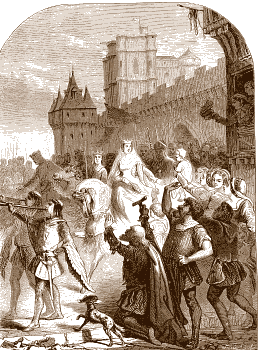
Robert Fawtier- The Capetian Kings of France- Monarchy and Nation (987-1328)
#xiii#robert fawtier#the capetian kings of france#blanche de castille#queens of france#regents#louis viii#louis ix#philippe ii#constance d'arles#robert ii#henri i#anne de kiev#philippe i#bertrade de montfort#adélaïde de savoie#louis vii#étienne de garlande#st bernard#aliénor d'aquitaine#adèle de champagne
4 notes
·
View notes
Text
Louis XIII and his cooking adventures 🍴🥞
When it comes to our Louis XIII cult, I often refer to the king's iconic omelettes, but what about his other stuff? For example, he really loved sweets (like beignets or jams), but could he also cook them? The answer is YES, and that's not even all yet!
Louis was a curious child who's head was already filled with various interests and cooking became one of them when he was only ten years old at the time (which is quite unusual for a king). First ever case of the king cooking was recorded on february 11th of 1611, when he was preparing milk soups for the Duchess of Guise / Catherine of Cleves. So milk soup, most likely, could be Louis' very first dish made by himself!
Of course many kids have a sweet tooth and our precious omelette king was not an exception which I guess is why he started to learn how to cook mostly from recipes of sweets. Also, take a shot every time I say "sweets" or "cooking" (don't..) 🕊️
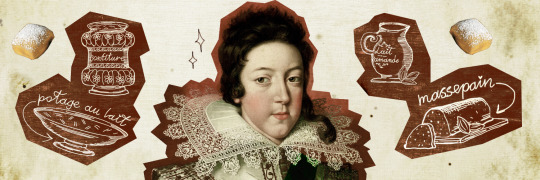
So, among 17th century royal sw- *ahem* DESSERTS we had in our menu – a jam, quince jelly, beignets (basically french donuts) and marzipans. In a well-known, among many of y'all Louis stalkers, journal of his doctor Jean Héroard I found some clear evidence of Louis XIII cooking some of these himself, so here it is feat. me periodically panicking over my own translation because my half-french friend is too busy atm and I don’t wanna bother them:
June 6th, 1611 — «He walks through the corridor from the study to the paneled gallery where he had an oven for making jams, he is amused to see how it's done.» I know it's not exactly him cooking, but I just wanted to leave it here :")
October 15th, 1612 — «Madame comes to see him; he has fun making jam with Mademoiselle de Vendôme»
January 29th, 1613 — «He often has fun making almond milk and marzipans at Madame's house.»
March 6th, 1615 — «It was very cold; he goes to the kitchen, makes omelettes, beignets, fried eggs; it was he who made them and ate a little of that he tasted.» Pretty sure the last few words could be translated better because it's always rather my terrible french or a little confusing way of Héroard's writing, so feel free to correct me.
February 3rd, 1616 — «He is preparing a small snack of dry jam for the queen, who must come to him at two o'clock. After going back to bed, he happily forms various battalions of his little silver men.»
February 5th, 1622 — «He leaves Saint-Germain, goes to Pontoise, where he enjoys making and eating beignets; while dining at Cormeille, he suddenly goes to the goblet in which he makes little cream puffs.» The original text says «petits choux au lait» and I have no idea what could that exactly be, but it seems like some sort of little éclair-like buns made of milk? Little cream puffs?? Maybe by «choux au lait» Jean meant «choux à la crème» which were invented back in 1540 in France.
I know you've been waiting for the quince jelly too, but unfortunately I couldn't find anything about the jelly :c Though, judging by what we've got here It's still quite possible Louis could cook quince jelly as well, hmm... Anyways, if you know something I don't know of the jelly mystery, hit me up!
In the future, this great love for desserts will be inherited by his son Philippe I, Duke of Orléans (brother of Louis XIV), who is also a very interesting character in history!!
In conclusion I must say that Louis not only had a sweet tooth, but also a big love for trying out different things, all this curiosity and pure excitement, even when it comes to something so simple and familiar like food, will never ever stop to fascinate me :"D
Btw speaking about Louis 'trying out different things', I of course still have a lot to share on this as well! Stay tuned and have a good day/night 💘💘💘
#I can't believe I wasted more time on the picture than the post itself#But at least now I can go make more Louis content :“”D#In my next post I will most likely cover something that is not food because he had A LOT of other talents obviously hahahaah#Honestly I could talk about him 24/7.... I just can't always be online to flood you with all this :“(#17th century#louis xiii#history of food#louis xiii le juste#king louis xiii
18 notes
·
View notes